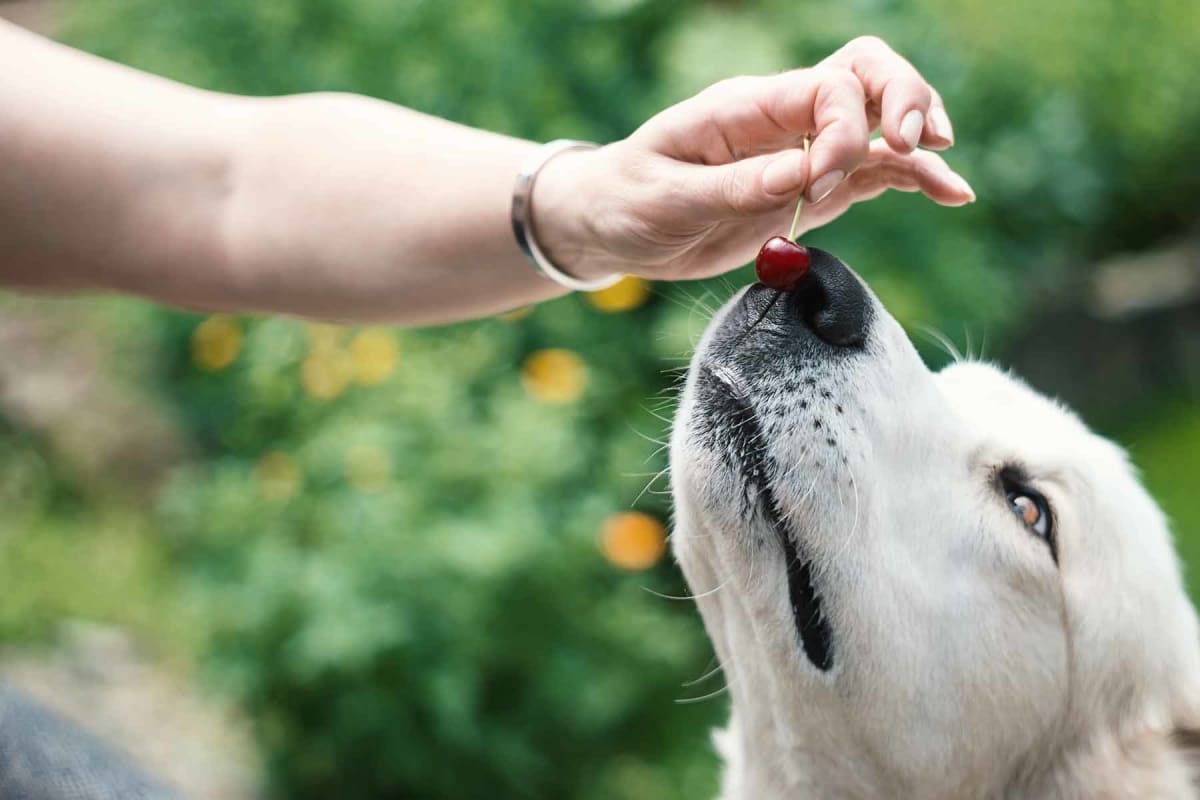
Can dogs eat cherries?
Can dogs eat cherries?
Can dogs have cherries?
The short answer is no, dogs should not eat whole cherries. While the flesh of cherries isn't toxic to dogs, cherry pits, stems, and leaves contain cyanide, which is poisonous to dogs. Even with dangerous parts removed, the cherry flesh itself can cause stomach upset in dogs due to its high sugar content.
Let's explore why cherries are problematic for your furry friend and what safe alternatives you can offer instead.
Are cherries bad for dogs?
Yes, cherries can be harmful to dogs for several reasons:
Cyanide poisoning risk: The pits, stems, and leaves of cherries contain cyanide compounds that are toxic to dogs. When ingested, these parts can release cyanide into your dog's bloodstream.
Choking hazard: Cherry pits are the perfect size to get lodged in a dog's throat, especially for smaller breeds.
Dental damage risk: The hard cherry pit can damage your dog's teeth if they bite down on it, potentially causing painful fractures.
Intestinal blockage: If your dog swallows cherry pits, they may cause blockages in the digestive tract, which can be life-threatening and may require emergency surgery.
Sugar content: Even the flesh of cherries contains natural sugars that aren't great for dogs in large amounts, potentially leading to dental issues, obesity, or diabetes with regular consumption.
Signs of cyanide poisoning in dogs
Watch for these symptoms if your dog has eaten cherries with pits:
Bright red gums
Difficulty breathing
Dilated pupils
Drooling
Tremors
Collapse
Diarrhea
Vomiting
Contact your vet or an emergency veterinary hospital if you notice your pup acting unusual or experiencing any of these symptoms.
Are cherries ever good for dogs?
In theory, the flesh of cherries does contain some beneficial nutrients like vitamins A and C, fiber, and antioxidants. However, the risks associated with cherries make them a poor treat choice. Removing the pit, stem, and leaves to safely feed cherry flesh to your dog is labor-intensive and not worth the minimal nutritional benefit.
Can dogs eat dried cherries?
No, dogs should not eat dried cherries. Dried cherries may still contain pits, and even when pitted, they have a concentrated sugar content that's unhealthy for dogs. Additionally, many commercial dried cherries contain added sugars or preservatives that can be harmful to your canine companion.
Can dogs eat maraschino cherries?
While maraschino cherries are typically pitted, they are not recommended for dogs. These bright red garnishes are heavily processed and contain high amounts of sugar, artificial coloring, and sometimes alcohol, none of which are good for your dog.
The excessive sugar in maraschino cherries can lead to obesity, dental problems, and even diabetes in dogs when consumed regularly. The artificial ingredients may also cause digestive upset or allergic reactions in some dogs.
What to do if your dog eats a cherry
If you catch your dog eating cherries, don't panic, but do take action:
Determine how many cherries were eaten: A single cherry probably won't cause serious harm, but multiple cherries increase the risk.
Check if they were pitted: If the cherries were already pitted, the risk is lower, but still monitor your dog for digestive issues.
Monitor for symptoms: Watch for signs of intestinal blockage (vomiting, constipation, decreased appetite, abdominal pain) or cyanide poisoning (difficulty breathing, bright red gums, dilated pupils).
Contact your veterinarian: When in doubt, call your vet. They may recommend bringing your dog in for an examination or advise you on what symptoms to watch for at home.
In severe cases: If your dog has consumed many cherry pits or is showing serious symptoms, seek emergency veterinary care immediately.
Safe alternative treats for dogs
Instead of cherries, consider the many fruits that are safe for dogs and offer similar nutritional benefits without the risks, including:
Blueberries: These small berries are packed with antioxidants and are small enough to serve as is, making them a perfect dog treat.
Strawberries: Rich in fiber and vitamin C, strawberries are a sweet treat most dogs love. Just remove the stems and cut into appropriate sizes.
Watermelon: A hydrating snack for hot days, just make sure to remove all seeds and the rind before offering it to your dog.
Apple slices: Apples provide fiber and vitamins, but always remove the core and seeds which contain trace amounts of cyanide, similar to cherry pits.
Frozen banana chunks: These make great summer treats and are easy on senior dogs' teeth while providing potassium and other nutrients.